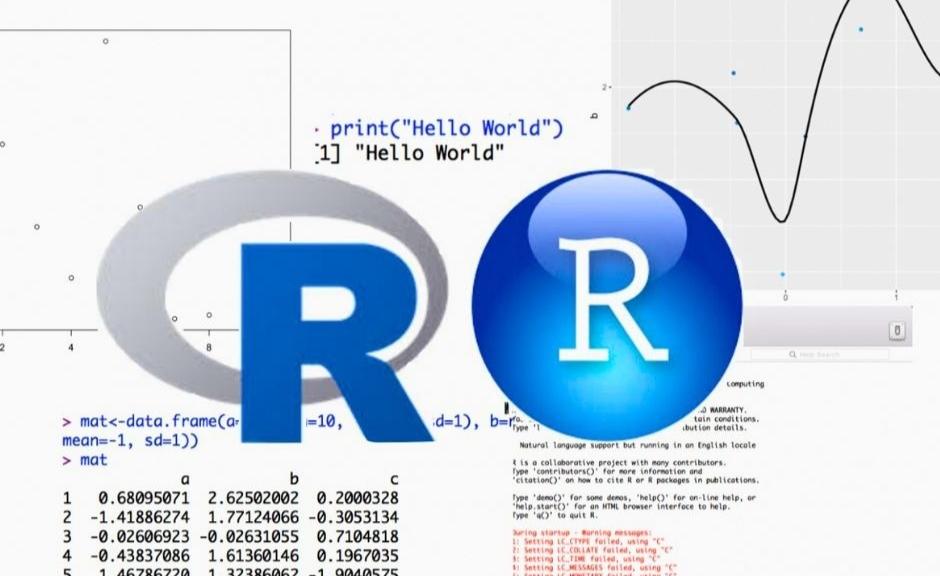-
Date:
From 25 Jun 2025 until 27 Jun 2025
-
Deadline for Applications:
23 May 2025
-
Location:
Faculdade de Ciências da Universidade de Lisboa, Campo Grande 1749-016 Lisboa
-
Duration:
18 hours (contact hours)
-
Schedule:
9h-12h30 and 14h-17h30m, Wednesday-Thursday; 9h-13h, Friday
-
Lecturer or Responsible:
Inês Fragata (CE3C-ACE) & Alexandre Blanckaert (CE3C-EGB)
-
Department Responsible:
Departamento de Biologia Animal, Faculdade de Ciências da Universidade de Lisboa
-
Nº (min - max) Students:
10-20

Objectives
Provide students with basic knowledge of R programming, allowing them to manipulate and visualize data with R.
Topics
- Introduction to R and R studio
- R Basic syntax
- Introduction to variable types and functions
- Manipulate vectors, matrices and data frames
- Read and load data into R
- Make graphics in R
Participants have to be present at 85% of the contact hours and actively participate in all activities.
This course can give credits to PhD programmes at CIÊNCIAS or of programmes with partnership from CIÊNCIAS and other institutions with 6h-7h of contact hours per ECT, as a function of specific requirements. For these students additionally to the exercises done during the week the delivery of a written report done after the course is mandatory. The report is also advised for other students requesting accreditation of the course in their institutions.
Minimum formation: Bachelor’s degree in biology or related areas. No previous knowledge of R is necessary.
Directed to: PhD or MSc students in Biology or related areas, and postdocs and other professionals working in related areas.
General Plan
Detailed plan:
- Introduction to R and R studio: students will become familiar with the R and R studio environments and will learn how to setup and manage a project using R studio.
- R Basic syntax: students will learn how to assign variables, create scripts and print to the console.
- Introduction to variable types and functions: the students will learn the different type of variables and learn how to distinguish functions from variables. The students will become familiarized with function syntax and outputs.
- Manipulate vectors, matrices and data frames: the students will learn how to create vectors, matrices and data frames and what are their different uses. They will also learn how to access the different data types, and extract information.
- Read and load data into R: the students will learn how to import data into R and how to quickly visualize it.
- Make graphics in R: the students will learn how to create graphics using basic R plot and how to configure several options. We will also do a quick overview of the ggplot2 package.
Funding
Students fees
Fee
Free for 1st year PhD students of CIÊNCIAS enrolling in it as part of the curricular year; also free for 1st year PhD students in the Doctoral programme Biodiversity, Genetics and Evolution (UPorto) and Biology and Ecology of Global Changes (UAveiro) when the course counts credits for their formation; in all these cases the delivery of a final report done after the course is mandatory; the course is also free for more advanced PhD students of the BIODIV programme (ULisboa or UPorto); 25 € for other PhD students from CE3C, 40 € for PhD students from institutions of the PEERS network (CFE); 70 € for CIÊNCIAS Master students, more advanced CIÊNCIAS PhD students and unemployed (not from CE3C), and unemployed; 90 € for BTI, BI and other PhD students; 125 € for Professionals and postdocs.
When the maximum number of students is reached, 10 vacancies will be available for non-paying 1st year PhD students mentioned above, being, by order of preference, students from: 1) CE3C; 2) BIODIV (not from CE3C); 3) CIÊNCIAS (not from CE3C); 4) Sustainability Science (not from CE3C or CIÊNCIAS); 5) BEAG (not from CE3C or CIÊNCIAS).
How to Apply
Candidates should complete the following APPLICATION FORM:
https://inqueritos.ciencias.ulisboa.pt/index.php/395932?lang=pt
Mind this is a common form to the Advanced R course, so please pay attention when you fill the field where it is asked if you apply just to one of them or both! If you intend to do the two courses, fill a SINGLE APPLICATION FORM.
This form is strictly confidential, as explained in the introduction, and the data are required because the CE3C Advanced Courses are also offered as part of the PRR programme of CIÊNCIAS.
When filling out the form, mind to:
- FILL ALL THE MANDATORY FIELDS;
- UPLOAD CV AND MOTIVATION LETTER, both mandatory; use the names as instructed there;
- If you want to resume later, SAVE the form, otherwise you will need to fill everything out again;
- At the end, SUBMIT the form before exiting.
If you have any questions, please contact the coordinator of the CE3C Advanced Courses, Margarida Matos (mmmatos@fc.ul.pt), and the teacher Inês Fragata (irfragata@fc.ul.pt).

